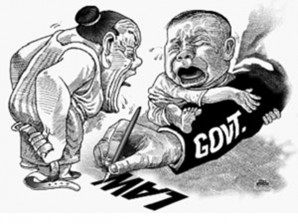Coincidence or not, last week’s death of a 5-year-old girl due allegedly to incessant abuse by her stepmother and a pupil’s accusation that his teacher beat him with a wooden meter stick occurred amid debate in Congress about a bill that seeks to outlaw corporal punishment for minors.
An informal survey run by administrators of the Lower House website showed that a majority of people support House Bill 4455, which was approved last week. It said a small segment are against it and a miniscule number are undecided.
The numbers can change once public debate on the bill gains momentum but if initial figures hold, we may see a lot of parents, teachers and adults haled to court or the police precinct based on the word of minors, who may or may not be prodded by others to pursue a complaint.
Many factors need to be considered, not least of which is the age-old question of whether society still sees physical punishment as a useful tool to discipline children or an outdated practice that only serves to antagonize and harden them into bitter, violent adults.
“Spare the rod, spoil the child” is an approach long dumped by studies that warned that parents who inflict physical punishment on children will only make them withdrawn, anti-social and rebellious.
The death of 5-year-old Kate Arianne Chu Flores of Mandaue City is yet another example of parental discipline to the extreme.
Subjected to beatings, food deprivation and plain lack of love at home, the girl became hysterical at the police station, when she was taken by her grandmother weeks before she was confined in the hospital, where she later died.
A 12-year-old pupil was “better off” since he managed to expose his teacher to his parents.
Corporal punishment as cruel, physical reprimands should be outlawed.
Imposing discipline is a parents’ job, extended to guardians, and those with moral ascendancy.
What lawmakers have to do is draw clear lines about what kind of correction can be given as loving but firm guidance to children.
At all times, this must be tempered with love and an optimistic view of what the human potential of a young life.
